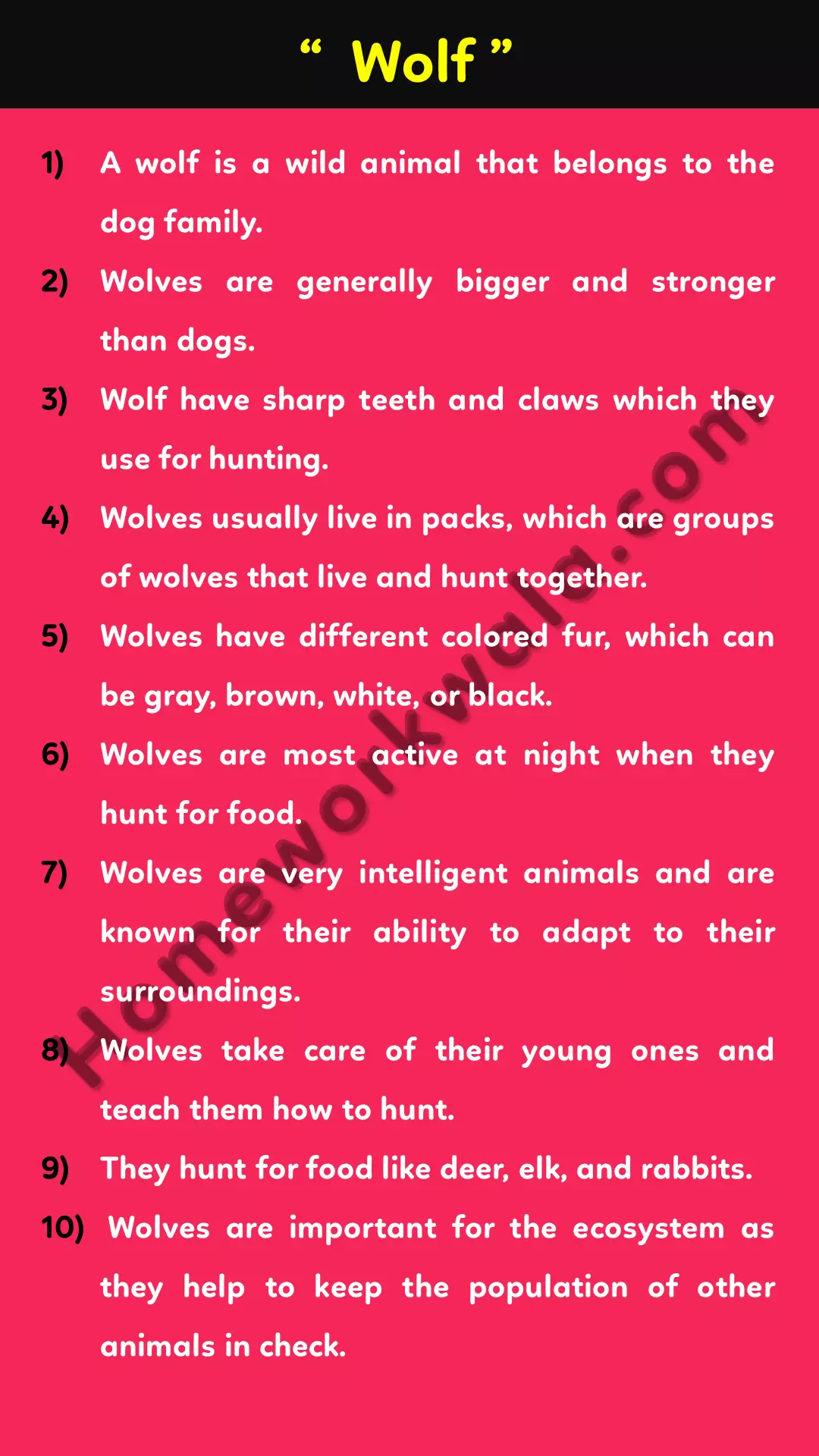Table of Content
Through this article, we are sharing 10 lines on Wolf in English. This post will help those students who are looking for information about Wolf in the English Language.
If any student wants to write a short essay on Wolf then, this post is very useful for them. Information about Wolf is very simple and easy for writing purposes.
These sentences on Wolf are very short and easy to understand, so any level of student can write on this topic.

Short essay on Wolf in English ( In 3 Formats )
Format-1
- A wolf is a wild animal that belongs to the dog family.
- Wolves are generally bigger and stronger than dogs.
- Wolf have sharp teeth and claws which they use for hunting.
- Wolves usually live in packs, which are groups of wolves that live and hunt together.
- Wolves have different colored fur, which can be gray, brown, white, or black.
- Wolves are most active at night when they hunt for food.
- Wolves are very intelligent animals and are known for their ability to adapt to their surroundings.
- Wolves take care of their young ones and teach them how to hunt.
- They hunt for food like deer, elk, and rabbits.
- Wolves are important for the ecosystem as they help to keep the population of other animals in check.
You May Also Like
Format-2
- Wolves have a strong sense of smell, which helps them to find their prey.
- They communicate with each other using howls, growls, and body language.
- Wolves are excellent runners and can run up to speeds of 40 miles per hour.
- They have thick fur that keeps them warm in cold weather.
- Wolves are found all over the world.
- They are carnivores, which means that they eat only meat.
- Wolves have keen eyesight that helps them to spot prey from a distance.
- The scientific name for the gray wolf is Canis lupus.
- Wolves have a reputation for being fierce and dangerous, but they are actually quite shy and prefer to avoid humans.
- Wolves are social animals and live in families called packs, which are led by an alpha male and female.
Format-3
- Wolves are very adaptable animals and can live in a variety of environments, from forests to tundra.
- Wolves are skilled hunters and they can take down prey much larger than themselves.
- Wolves have powerful jaws that allow them to crush bones and eat every part of their prey.
- Wolf packs have a strict social hierarchy, with dominant wolves at the top and submissive wolves lower down.
- Wolves have excellent hearing, which they use to detect the slightest sounds of prey or danger.
- Wolves play an important role in their ecosystem, as they help to control the populations of other animals.
- They are very loyal to their pack and will defend it against any threats.
- Wolves have a keen sense of territory and will defend it against other wolf packs.
- Wolf cubs are born blind and helpless and rely on their parents and older siblings for survival.
- Wolves are sometimes hunted for their fur or because they are seen as a threat to livestock, but many conservation efforts are working to protect them.

FAQ
- What is a wolf?
- What do wolves eat?
- Are wolves dangerous to humans?
- How do wolves communicate?
- How do wolves hunt?
- Are wolves endangered?
- What is the average lifespan of a wolf?
- How do wolves mate and reproduce?
- How can we help protect wolves?
A wolf is a wild carnivorous animal that belongs to the dog family.
Wolves are carnivores and eat meat, such as deer, elk, moose, bison, rabbits, and other animals.
Wolves are generally shy and prefer to avoid humans. However, if they feel threatened or cornered, they may attack.
Wolves communicate with each other using howls, growls, body language, and scent markings.
Wolves hunt in packs, using their speed, strength, and teamwork to take down prey.
Some species of wolves are endangered, including the Mexican gray wolf and the red wolf.
The lifespan of a wolf varies depending on the species and environmental factors but generally ranges from 6-8 years in the wild and up to 16 years in captivity.
Wolves mate for life and typically breed once a year, with the female giving birth to a litter of 4-6 cubs.
We can help protect wolves by supporting conservation efforts, reducing habitat destruction, and avoiding activities that harm wolves or their environment.
We hope! You will get some learning through this article. If you really like this article about Wolf in English, then please share it with your friends.
We working on helping the students to do their homework in a simple and easy way. Essay writing on Wolf is generally asked the students in Schools.